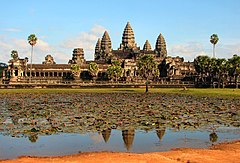Angkor Wat
| Angkor Wat អង្គរវត្ត |
|
|---|---|
 |
|
| Name | |
| Other names | Nokor Wat (Khmer: នគរវត្ត) |
| Proper name | Prasat Angkor Wat |
| Geography | |
| Coordinates | 13°24′45″N 103°52′0″E / 13.41250°N 103.86667°ECoordinates: 13°24′45″N 103°52′0″E / 13.41250°N 103.86667°E |
| Country | Cambodia |
| Locale | Angkor, Siem Reap Province, Cambodia |
| Architecture | |
| Architectural styles | Khmer |
| History and governance | |
| Date built | 12th century |
| Creator | started by Suryavarman II completed by Jayavarman VII |
| Official name | Angkor |
| Type | Cultural |
| Criteria | i, ii, iii, iv |
| Designated | 1992 (16th session) |
| Reference no. | 668 |
| Region | Asia and the Pacific |
Angkor Wat (Khmer: អង្គរវត្ត or "Capital Temple") is a temple complex in Cambodia and the largest religious monument in the world, with the site measuring 162.6 hectares (1,626,000 m2; 402 acres). It was originally constructed as a Hindu temple of god Vishnu for the Khmer Empire, gradually transforming into a Buddhist temple toward the end of the 12th century. It was built by the Khmer King Suryavarman II in the early 12th century in Yaśodharapura (Khmer: យសោធរបុរៈ, present-day Angkor), the capital of the Khmer Empire, as his state temple and eventual mausoleum. Breaking from the Shaiva tradition of previous kings, Angkor Wat was instead dedicated to Vishnu. As the best-preserved temple at the site, it is the only one to have remained a significant religious center since its foundation. The temple is at the top of the high classical style of Khmer architecture. It has become a symbol of Cambodia, appearing on its national flag, and it is the country's prime attraction for visitors.
Angkor Wat combines two basic plans of Khmer temple architecture: the temple-mountain and the later galleried temple. It is designed to represent Mount Meru, home of the devas in Hindu mythology: within a moat and an outer wall 3.6 kilometres (2.2 mi) long are three rectangular galleries, each raised above the next. At the centre of the temple stands a quincunx of towers. Unlike most Angkorian temples, Angkor Wat is oriented to the west; scholars are divided as to the significance of this. The temple is admired for the grandeur and harmony of the architecture, its extensive bas-reliefs, and for the numerous devatas adorning its walls.
...
Wikipedia

